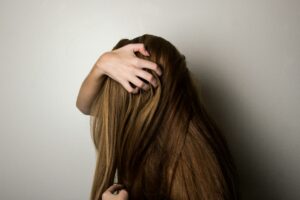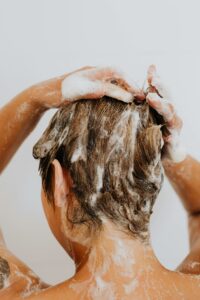Dry Scalp Remedies: Natural Dandruff Shampoos Explained

Snow flakes? Pretty. Flakes in your hair? Probably not the fashion statement you’re going for. Nothing can ruin a good hair day the way that dandruff or a dry scalp can.
Many of us have or will encounter this problem at some point in our lives. It seems to be an inevitable part of being human. At the most inconvenient of times, you’ll suddenly see white flurrying down from your head. Although this nuisance is simply the product of some natural processes occurring in and on our bodies, it tends to be one of those embarrassing things that we want to find a solution for ASAP. So, keep reading to find out what causes a dry scalp and dandruff and what you can do about it!
Dandruff Vs Dry Scalp Explained

How do you know if you have dandruff or dry scalp?
Many people confuse dandruff and a dry scalp as being two sides of the same coin. But these people are mistaken. Dandruff vs dry scalp symptoms are not the same thing. So, how can you know what exactly is going on up there?
Well, let’s start by explaining a little more about dandruff. Dandruff occurs when a collection of dead skin cells shed or fall from your head. But it is the result of very specific causes. A fungal or other scalp infection can lead to dandruff. A fungus by the name of Malassezia is what often causes our dandruff. Risk factors that make this fungus multiply quickly include stress, hormones, and age. Dandruff can also be the result of a sensitivity to certain things such as specific hair products, or to the oils that your scalp secretes.
Our skin cells typically multiply as necessary, after which they die and we shed them. If a person suffers from dandruff, the skin cells on their scalp will shed faster than typical. The faster your dead skin cells shed, the more severe your dandruff will be.
So how can you tell if you have dandruff or a dry scalp? Firstly, the flakes will appear different. Dandruff flakes will be larger and will have a yellowish or oily look. Conversely, dry scalp flakes will be smaller and will appear white. If you’re suffering from dandruff, you’ll most likely need to actively do something in order to treat the problem. Yet if you have a dry scalp, the problem may go away on its own with only mild changes to your routine such as washing your hair less often.
What Causes Dry Scalps? Why Is My Scalp So Dry?
As you now know, a dry scalp occurs for different reasons than dandruff. A dry scalp is basically the result of not enough moisture, specifically oil, in the scalp. Do you ever experience dry hands or legs during the wintertime, with accompanying itchiness and irritation? Well, that’s basically what happens to the skin on your scalp too. It gets dry just like the rest of our bodies if we don’t moisturize it properly! And that leads to flaking and irritation, in addition to hair that looks dry.
You’re likely to experience a dry scalp if you wash your hair too frequently, you expose your scalp to cold and dry air, or you suffer from a skin condition such as eczema.
Essential Oils For Dry Scalp Breakdown

Essential oils can help make your dry scalp problems disappear.
If you’re looking to go the natural route, kudos to you. One popular natural option for treating a dry scalp is to incorporate the use of essential oils into your routine.
Tea tree oil is probably one of the most effective oils for this purpose. It has strong antibacterial and antifungal properties, which helps prevent fungus or other things from attacking your scalp. Just add a drop of tea tree oil to 4 ounces of a carrier oil like coconut oil. First, warm the carrier oil up in order to help it spread evenly. Then massage it into your scalp, put on a shower cap and let the oils sit on your head for a half-hour before you wash your hair. Your hair type will determine how frequently you’ll need to do this. Thicker hair might need it every day, while thinner hair won’t need it as much.
Another option for you to try is rosemary oil. Rosemary oil has antioxidant and antibacterial qualities that can stimulate the scalp and promote the growth of healthy hair. Rosemary’s also good for anti-dandruff treatment. This is because of its antifungal, astringent, and decongesting qualities. It can minimize oil, buildup, and flakes which come with dandruff.
As you now know, fungus can cause dandruff, which is part of how rosemary oil gets to the root (pun intended!) of the problem. Just combine a 1:3 ratio of rosemary oil and a carrier oil such as jojoba oil and place the mixture in a dark jar or bottle. Then take a little bit of the mixture and massage it into your scalp. Start off by doing this each day until your dandruff goes away, and then you can transition to doing it just a few times a week to make sure that the problem stays away.
What Is The Best Dandruff Shampoo? Tea Tree Oil Shampoo For Dandruff Breakdown
When it comes to finding the best dandruff shampoo, you might be feeling lost. Well, there are a few key ingredients that you should make sure to look out for before selecting which one to purchase.
For example, salicylic acid in shampoo helps to remove scales before there is a buildup. It loosens the proteins in your skin, and it helps to relieve irritation and the accompanying itching.
Another great ingredient you should be on the lookout for is coal tar. Coal tar can help with dandruff as well as other skin issues like psoriasis and eczema. This ingredient works by reducing the creation of skin cells and minimizing redness, inflammation, itching, and irritation. It’s a powerful ingredient that really works. Just make sure to rinse it out fully when you’re done, as it might cause some sensitivity to sunlight on the applied areas.
Tea tree oil is a magnificent little treat for your hair, and it’s a great natural treatment for dandruff. When you use diluted tea tree oil, such as in tea tree oil shampoo, the oil promotes blood flow to the scalp. (If you’re looking for a good tea tree oil shampoo for dandruff, I know of a holistic company that makes a great one.) This makes your hair follicles healthier, resulting in stronger hair. Tea tree’s anti-bacterial qualities and ability to unclog pores on the scalp help prevent infections as well as dandruff. And its antifungal properties can help target an overgrowth of the yeast which can cause dandruff.
Sulfate Free Dandruff Shampoo Explained

Sulfates can remove too much oil and hydration from the scalp.
Sulfates make an appearance in plenty of shampoos, but are they healthy for you? They are what make our shampoo foam, and they’ve overall healthy to use in regular amounts. The downsides of sulfates are that they sometimes remove too much oil from the scalp, and they can also remove too much moisture from the scalp, causing the hair to be dry and unhealthy. This makes it more likely for the scalp to experience irritation.
Although most people can use sulfate shampoos without negative effects, a sulfate-free dandruff shampoo is the best option if you have a sensitive scalp. It’s also a good idea if you have done any hair treatments, as a sulfate-free shampoo will better preserve your treatment.
Sulfate-free dandruff shampoos usually include natural ingredients with anti-infective properties. They most often include aloe vera, tea tree oil, eucalyptus, argan, jojoba and/or coconut oil.
Dandruff Treatment Explained
Scalp changes are almost always reversible. This is because they mostly originate from changes in the scalp’s fungi population and/or sebum composition. When the sebum balance is restored and the excess fungus is removed, the scalp rediscovers its natural state and the problem goes away on its own, without you having to resort to any serious medical intervention.
Mainstream medicine has several ways of treating dandruff, and nowadays the prognosis leans towards prescribing anti-fungal shampoos or creams for those who complain of such issues. This is in contrast to earlier times when an anti-inflammatory treatment would have been prescribed by the skin doctor. With these anti-fungal remedies, the causes of the dandruff are taken care of, and the treatment alleviates the symptoms. Common anti-fungal treatments include:
Ketoconazole
This is a medication that has an over-the-counter version and a prescribed version. You can use ketoconazole to treat several different infections of fungi and yeast. It is available in a wide range of medical shampoos, and it works by stopping the fungi from creating cell membranes. By doing this, the fungus’ lifeline is effectively cut, and it dies. The infection then clears up, and your scalp can resume normal functionality.
Econazole
Econazole is a cream or foam which can treat skin infections. You can apply it directly to the skin. Seeing as it’s a prescribed medication, dosages will often vary, so consult your healthcare provider before going ahead. Some people are allergic to this specific medication, and if that’s the case for you, luckily there are other options out there!
Miconazole
Appearing on the World Health Organization’s “Most Important Medications” list, miconazole can cure fungal infections when applied to the skin or membrane. It has anti-fungal, anti-bacterial, and anti-parasitic properties. For oral use, it comes in the form of oral gel and a tablet. It is used as a cream or powder for external use.
Washing with an anti-fungal shampoo – be it an over-the-counter pharmaceutical product, or a prescription-strength medical shampoo prescribed by a physician – can bring about fantastic results. Many times, people who are sure to wash their hair and scalp with anti-fungal, natural dandruff shampoos, even as frequently as daily or semi-daily (at first), can find this to be the answer to their prayers. Chronic cases of flaking, itching, redness, and general discomfort can, in fact, be cured!
There are times when a doctor or pharmacist will recommend an overnight dandruff treatment for a week or two, as opposed to an ongoing regiment of daily/semi-daily hair washing. In these cases, the anti-fungal treatment is massaged deep into the scalp for several minutes.
The hair and scalp are then covered with a shower cap, and in the morning the shower cap is removed. The remaining shampoo is massaged into the scalp again and is then rinsed off with water. If there is no significant change in a week or two (depending on the instructions), another visit to your physician should be made in order to see how to best continue the treatment.
Home Remedies For Dry Scalps

Drinking water can help with dry scalp!
As you’d expect, a dry scalp is the result of a lack of moisture. Some common causes of this include washing your hair too frequently or not drinking enough water throughout the day. These are things that both have easy fixes. Yet many people incorrectly assume that abstaining from washing their hair will alleviate the symptoms. They think that any hair washing will make the dryness even worse, thus adding to the already itching and discomforting sensation. In fact, it is the other way around. Washing the hair and scalp is essential for the healing process. Without washing the affected areas, the scaling will continue. Washing the hair and scalp on a regular basis can help minimize the buildup of scaling. In some cases, it can eliminate it altogether. It depends on your scalp and hair type, as well as your genetic makeup.
When it comes to hair washing, there is another thing that is important to remember: whenever possible, keep your hair and scalp dry. In other words, when you are not in the shower, or not using an overnight kind of treatment, it is best to keep those areas dry. Why? Because fungi thrive in moisture, and it is a big part of their life cycle.
You should avoid long periods of time when the hair and scalp are wet. Yet showering and bathing are all well and good. And washing the hair is one of the best things to do against the conditions of dandruff and seborrheic dermatitis.
However, leaving the scalp and hair wet for long periods of time, after the bath or shower have already taken place, is not recommended. Such behavior could facilitate the growth of the fungi which are causing those issues to begin with.
When it comes to home remedies for dry scalps, research shows that aloe vera is good due to its anti-inflammatory properties. It can both help moisturize the scalp to prevent dryness, as well as relieve itching that accompanies dryness.
And if you’re looking for another at-home treatment option for a dry scalp, try mashed bananas. Yes, you read that correctly. What you usually associate with baby food can also double as just the thing you need to deliver relief to your scalp. Bananas contain potassium, oils, and vitamins, all of which can hydrate your scalp, give your hair a boost and even help with dandruff. You can make your own banana conditioner to try it out for yourself.
DIY Dandruff Shampoo
If you’d prefer to try making your own dandruff shampoo rather than buying one, doing so is easy enough. With this simple DIY dandruff shampoo recipe, all you need is about a half-hour and you’ll be on your way to dandruff-free hair.
Start off by placing 2 ounces of distilled water and 7 ounces of liquid castile soap in a sealable container. Add 2 ounces of sweet almond oil and then shake those ingredients together. Separately, melt 8 ounces of coconut oil and 2 ounces of shea butter. Once you melt it, pour that mixture into the sealable container. Seal the container and shake very well until you’ve combined all of the ingredients. Then add 40 drops of rosemary oil and 10 drops of eucalyptus oil to the container. Mix everything all together.
It’s important that you shake the container well before each time you use the shampoo. Then simply apply it as you would with a normal shampoo. Let it sit for a minute or two before you rinse it out. As with all shampoo, avoid contact with your eyes.
You may also like our Cedarwood Dandruff Shampoo
Conclusion
When your shoulders have it looking like it’s snowing in the summer, you know dandruff or a dry scalp is to blame. But lucky for you, you now know how to differentiate between the two so that you can properly and thoroughly treat the issue.
With essential oils, shampoos, and other remedies out there, there are plenty of ways to say goodbye to your flaky woes. Whether you opt to buy a treatment product or make one by yourself, there are a bunch of easy and painless ways to solve this issue. So say goodbye to the baseball cap and say hello to parading around your luscious locks.

